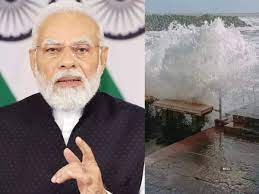In a remarkable display of disaster management, the Indian government, led by Prime Minister Narendra Modi, set a global standard in handling Cyclone Biparjoy in Gujarat, achieving zero casualties amid the high-velocity storm. Union Minister Mansukh Mandaviya, a senior leader from the Bharatiya Janata Party (BJP), provided provided an overview of the government’s efforts in a recent briefing.
Cyclone Biparjoy made landfall in Jakhau on the Kutch coast of Gujarat last Thursday, exhibiting wind speeds of 125 kmph over a 200 km range. The cyclone resulted in widespread damage to infrastructure, including houses, electric poles, and trees across eight coastal districts. However, through efficient coordination and swift action, over 110,000 people were safely evacuated and critical facilities were made available at shelter homes, resulting in no loss of life.
Mandaviya highlighted the commendable role of the Gujarat government in this feat, particularly given the logistical challenges of Gujarat’s coastline, home to two significant ports, Mundra and Kandla, which handle 40% of India’s cargo. The massive evacuation process also included thousands of port workers.
Guided by the central government, local agencies, and the state government, all individuals from 112 villages within the cyclone’s expected path were evacuated, aligning with the overarching aim of zero casualties. The welfare of animals was also considered, with over 200,000 moved to safer ground, resulting in only 71 losses. Additional proactive measures such as preemptive tree trimming further mitigated the risks.
Essential emergency arrangements included ensuring hospital readiness, oxygen supply, and adequate bed provisioning. Over 600 shelter homes were prepared, providing clean water, food, and other necessities for a week. These facilities were designed to accommodate both genders and even included comforts such as swings for children.
Despite these successful efforts, Rajasthan, governed by the Congress party, experienced a heavier toll as the cyclone progressed, even though it had considerably weakened by that stage. Upon entering Rajasthan through Jalore and Barmer areas as a ‘deep depression’, the storm caused heavy rainfall, severe waterlogging, and led to the cancellation of several train services. Red and orange alerts were issued in several districts, including Barmer, Jalore, Sirohi, Pali, and Jodhpur.
The contrasting situations in Gujarat and Rajasthan underscore the importance of swift disaster preparedness and response.
With increasing climate unpredictability, the Modi government’s management of Cyclone Biparjoy provides a critical case study on how proactive measures and coordinated efforts can significantly mitigate the adverse impacts of such natural calamities.




